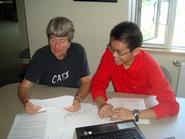
Yinghan Ding ’12 is an international student at Hamilton, and so are some of his friends. When it comes time to head home for winter break, they might want to heed his advice about buying airline tickets – by the end of the summer, Ding will be practically an expert on the topic. In the spring, he received an Emerson Grant to study price fluctuations in the airline industries. Because the Airline Deregulation Act of 1978 eliminated most of the U.S. government’s interference in the economic standing of airlines, Ding is curious to see whether or not the government needs to become reacquainted with airline regulation in order to achieve stable prices that will benefit both consumers and the industry.
The Emerson Grant Foundation was created in 1997 to stimulate student collaboration with faculty members on research projects. Ding’s advisor this summer is Lecturer in Economics Margaret Morgan-Davie.
With the surge of information now available on the Internet, it is easy for consumers to track price changes and compare rates. However, most people do not know how to intelligently research companies, and might not expect that sometimes an airfare does not skyrocket during the last few days before the flight departs. Ding is attempting to understand the factors that influence price-making policies, and has made graphs that document the trends in airfare. Later, he will look at his findings in the context of the government and decide whether or not it should intervene.
In the beginning of the summer, Ding selected three flight paths that he thought would be most indicative of American travel: New York to Los Angeles, Boston to Chicago, and Philadelphia to Atlanta. He also designated three international routes: New York to London, Chicago to Rio de Janeiro, and Los Angeles to Tokyo. Starting in May and continuing for nine weeks, he followed the prices of these flights for United Airlines, U.S. Airways, Delta, Northwest, and Continental Airlines. He has discovered that some companies do not significantly raise their prices even as early as seven weeks before a given flight.
He has also concluded that airline hubs may play a role in different companies’ rates. With more hubs, there is a greater risk of vacant seats, so companies lower their prices to attract consumers. Fewer hubs leads to less capacity, so companies raise their prices. These and other observations will contribute to a new ticket-purchasing strategy that Ding will pass onto others.
“It might be beneficial to many people who don’t pay as much attention to the prices and then regret it afterwards,” he said.
Ding intends to major in mathematics, and has two options in mind for his post-Hamilton profession. If the economy recovers from its downturn, he would consider being an actuary for an insurance company, or going into investment banking. Graduate school, however, has always appealed to him. If the economy continues to recede, he might get his master’s degree and doctorate so he can become a math professor. Ding’s campus involvements include writing science articles for The Spectator and volunteering for Project SHINE.
Ding is a graduate of Beijing No. 8 High School.
The Emerson Grant Foundation was created in 1997 to stimulate student collaboration with faculty members on research projects. Ding’s advisor this summer is Lecturer in Economics Margaret Morgan-Davie.
With the surge of information now available on the Internet, it is easy for consumers to track price changes and compare rates. However, most people do not know how to intelligently research companies, and might not expect that sometimes an airfare does not skyrocket during the last few days before the flight departs. Ding is attempting to understand the factors that influence price-making policies, and has made graphs that document the trends in airfare. Later, he will look at his findings in the context of the government and decide whether or not it should intervene.
In the beginning of the summer, Ding selected three flight paths that he thought would be most indicative of American travel: New York to Los Angeles, Boston to Chicago, and Philadelphia to Atlanta. He also designated three international routes: New York to London, Chicago to Rio de Janeiro, and Los Angeles to Tokyo. Starting in May and continuing for nine weeks, he followed the prices of these flights for United Airlines, U.S. Airways, Delta, Northwest, and Continental Airlines. He has discovered that some companies do not significantly raise their prices even as early as seven weeks before a given flight.
He has also concluded that airline hubs may play a role in different companies’ rates. With more hubs, there is a greater risk of vacant seats, so companies lower their prices to attract consumers. Fewer hubs leads to less capacity, so companies raise their prices. These and other observations will contribute to a new ticket-purchasing strategy that Ding will pass onto others.
“It might be beneficial to many people who don’t pay as much attention to the prices and then regret it afterwards,” he said.
Ding intends to major in mathematics, and has two options in mind for his post-Hamilton profession. If the economy recovers from its downturn, he would consider being an actuary for an insurance company, or going into investment banking. Graduate school, however, has always appealed to him. If the economy continues to recede, he might get his master’s degree and doctorate so he can become a math professor. Ding’s campus involvements include writing science articles for The Spectator and volunteering for Project SHINE.
Ding is a graduate of Beijing No. 8 High School.
Posted August 25, 2009
